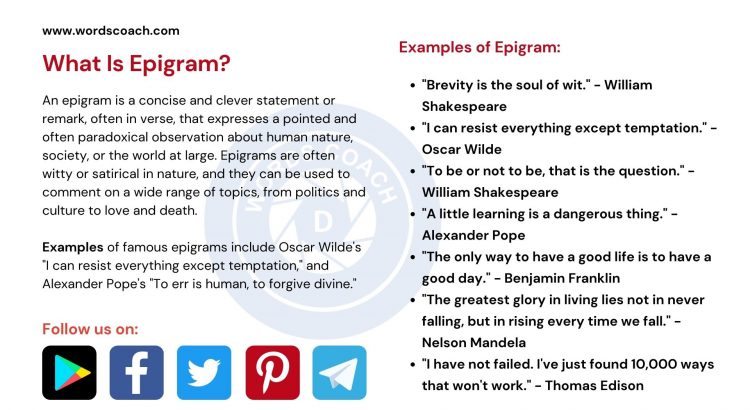What Is an Epigram?
An epigram is a concise and clever statement or remark, often in verse, that expresses a pointed and often paradoxical observation about human nature, society, or the world at large. Epigrams are often witty or satirical in nature, and they can be used to comment on a wide range of topics, from politics and culture to love and death.
Epigrams can be found in various forms of literature, such as poetry, prose, or even inscriptions or inscriptions on buildings and monuments. They can be short or long, and they can be serious or humorous, depending on the context in which they are used.
Examples of famous epigrams include Oscar Wilde’s “I can resist everything except temptation,” and Alexander Pope’s “To err is human, to forgive divine.”
What Makes an Epigram Different from a Proverb?
| Epigram | Proverb |
| An epigram is a short, interesting and witty thought or idea on a particular subject, usually presented in a funny manner. | A proverb is a short statement that conveys a basic truth in a direct or satirical manner. |
| An epigram is usually said by someone and documented. | A proverb is not quoted by a specific person, but a general saying passed on from one generation to another. |
| For example: “It is better to light a candle than curse the darkness.” – Eleanor Roosevelt | For example: A stitch in time saves nine. |
Examples of Epigrams
Some examples of epigrams include:
- “Brevity is the soul of wit.” – William Shakespeare
- “I can resist everything except temptation.” – Oscar Wilde
- “To be or not to be, that is the question.” – William Shakespeare
- “A little learning is a dangerous thing.” – Alexander Pope
- “The only way to have a good life is to have a good day.” – Benjamin Franklin
- “The greatest glory in living lies not in never falling, but in rising every time we fall.” – Nelson Mandela
- “I have not failed. I’ve just found 10,000 ways that won’t work.” – Thomas Edison
- “Knowledge speaks, but wisdom listens.” – Jimi Hendrix
- “The only true wisdom is in knowing you know nothing.” – Socrates
- “The more things change, the more they stay the same.” – Alphonse Karr
- “The only thing necessary for the triumph of evil is for good men to do nothing.” – Edmund Burke
- “The pen is mightier than the sword.” – Edward Bulwer-Lytton
- “We are what we repeatedly do. Excellence, then, is not an act, but a habit.” – Aristotle
- “The best way to predict your future is to create it.” – Abraham Lincoln
- “The only way to do great work is to love what you do.” – Steve Jobs
- “A witty saying proves nothing.” – Voltaire
- “The difference between genius and stupidity is that genius has its limits.” – Albert Einstein


